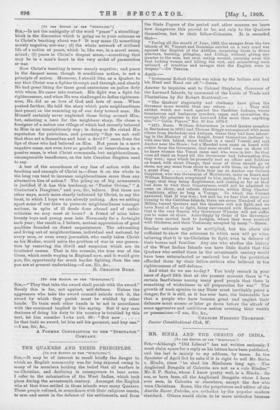[TO TEM EDITOR OF TRI1 " SPECTATOR." I SIEr — I13 not
the ambiguity of the word "peace" a stumbling- block in the discussion which is going on in your columns as to Christ's teaching about war ? It may mean (1) something merely negative, not-war; (2) the whole network of civilised life of a nation at peace, which is, like war, in a moral sense, mixed ; (3) peace in Christ's deepest sense,—something that may be in a man's heart in the very midst of persecution or war.
Now Christ's teaching is never merely negative; and peace in the deepest sense, though it conditions action, is not a principle Of action. Moreover, I should like, as a Quaker, to say that Christ was a fighter through and through, and clearly He had great liking for those good centurions on police duty with whom He caine into contact. His fight was a fight for righteousness, and when He was challenged to define righteous- ness, He did so as love of God and love of man. When pushed further, He told the story which puts neighbourliness (nob peace) as the summing up of our duty toward man. He Himself certainly never neglected those living around Him, but, selecting a hero for the neighbour story, He chose a foreigner of a nation one village of which had recently behaved to Him in an unneighbourly way ; in doing so He risked His reputation for patriotism, and presently "Say we not well that thou art a Samaritan and haat a devil?" came from the lips of those who had believed on Him. Not peace in a mere negative sense, not even love or goodwill or benevolence in a passive sense, is what Christ commands, but neighbourliness, unconquerable beneficence, as the late Caroline Stephen used to say.
A test of the accordance of any line of action with the teaching and example of Christ is,—Does it on the whole in the long run tend to increase neighbourliness more than any alternative line of action? The piling up of big armaments is justified if it has this tendency, as "Pastor Ovium," " A Centurion's Daughter," and you, Sir, believe. But there are other ways, much more clearly indicated by Christ, to say the least, in which I hope we are already uniting. Are we setting apart some of our time to promote neighbourliness amongst nations, in spite of ill deeds done abroad and of unfair criticism we may meet at home ? A friend of mine takes twenty boys and young men into Normandy for a fortnight each year; the result is, I believe, mutual appreciation of good qualities fOunded on direct acquaintance. The advocating and living out of neighbourliness, individual and national, by every man, or even every journalist, who really takes Christ as his Mailer, would solve the problem of war in one genera- tion by removing the illwill and suspicion which are its irrational causes. That is the crusade, the true war of the Cross, which needs waging in England now, and it would give you, Sir, opportunity for much harder fighting than the one you are at present undertaking.-.—I am, Sir, &c., R. CHRISTIE BURN.










































 Previous page
Previous page